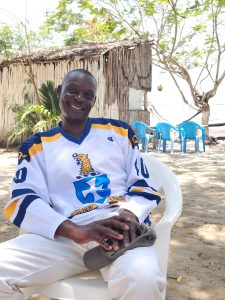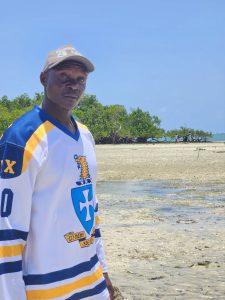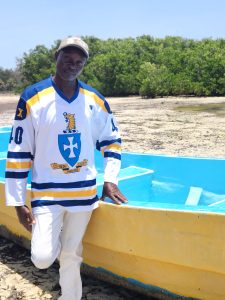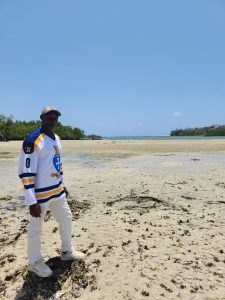''Mi chiamo Mwarua, vengo da Mtwapa e ho 46 anni. Faccio il pescatore nella cooperativa di Mtwapa da 15 anni. Ho iniziato a pescare perché a 10 anni ho improvvisamente perso i miei genitori: ho dovuto lasciare la scuola e cercare velocemente un'attività che mi permettesse di sostenere le mie otto sorelle. Ho imparato a pescare grazie a mio zio, che è un pescatore a Mtwapa e mi ha insegnato a farlo. La pesca mi ha aiutato molto a sostenere le mie sorelle. Oggi ho 9 bambini tra i 16 ai 29 anni. Vado a pescare tutti i giorni tranne il venerdì, che è il giorno della preghiera. Vado a pescare sia in alta stagione che in bassa stagione, perché ho bisogno di sfamare i bambini. In alta stagione passo circa 8 ore in mare, dalle 6 di mattina alle 2 di pomeriggio. Mi piace essere pescatore; è quello che faccio da tutta la vita. Ogni volta che vado a pescare, sono costretto a noleggiare la barca e la rete da pesca perché non possiedo nessuna attrezzatura. Preferirei averla per risparmiare i soldi del noleggio. In più, ultimamente pescare è diventato più difficile: si trova sempre meno pesce nell'oceano e penso che sia dovuto all'inquinamento delle fabbriche vicine. Il mio pesce preferito è il tonno: lo riesco a pescare qui vicino all’estuario. A casa mangiamo pesce: tutti i giorni riesco a portare a casa un pochino del pesce che non vendo, e cucinarlo.''
‘’My name is Mwarua, I come from Mtwapa and I am 46 years old. I have been a fisherman in Mtwapa BMU for the last 15 years. I started fishing because when I was 10 years old I suddenly lost my parents: I had to leave school to find any activity to allow me to sustain my eight sisters. I learnt how to fish thanks to my uncle, who is a fisherman in Mtwapa and taught me how to do it. Fishing helped me a lot to sustain my sisters. Today I have 9 kids, their ages range from 16 to 29 years old. I go fishing everyday apart from Fridays, which is prayers day. I fish both during low and high season, because I need to feed the kids. During high season I normally spend around 8 hours in the sea, from 6 am to 2 pm. I enjoy being a fisherman: fishing is the main activity I have been doing for my whole life. Everytime I go fishing, I have to rent the boat and the fishing gears because I don’t own this equipment. I would prefer to own my own, so as to save some money. Also, lately fishing has become more difficult: I think there's less and less fish in the ocean and I think it’s because of the pollution created by nearby factories. My favourite fish is tuna: it is possible to find some tuna near the creek here. We eat fish at home: everyday, I can take home the fish I don’t sell and use it for consumption.’’
MWARUA vive a Mtwapa, villaggio situato nella contea di Kilifi a 15 km a nord di Mombasa. L'iniziativa “Go Blue” finanziata dall’Unione Europea e realizzata da Aics insieme a CIHEAM Bari, interviene a Kilifi per rafforzare la filiera della pesca, fornendo sostegno diretto alla cooperativa di pescatori di Mtwapa, dove lavora Mwarua. Gli interventi a favore della cooperativa includono la realizzazione di attività di formazione, l’acquisto di imbarcazioni, strumenti ed equipaggiamenti per la pesca, la riabilitazione del mercato del pesce, il miglioramento della catena del freddo, l'installazione di equipaggiamenti informatici per migliorare l’attività di analisi dati relativi alla pesca, e l'introduzione di un sistema di certificazione che attesti standard qualitativi definiti per il pescato, che permetterà ai pescatori di migliorarne la commercializzazione.
MWARUA lives in Mtwapa, a village located in Kilifi County, 15 km north of Mombasa. The "Go Blue" initiative funded by the European Union and implemented by Aics together with CIHEAM Bari intervenes in Kilifi to strengthen the fishery value chain through the provision of direct support to the Mtwapa Beach Management Unit, where Mwarua works. The interventions in favor of the cooperative include the realization of training activities, the provision of boats, tools and fishing equipment, the rehabilitation of the fish market, the improvement of the cold chain, the installation of IT equipment to improve data analysis related to fishing, and the introduction of a labelling scheme certifying defined quality standards along the value chain, which will increase the fish products' value and will allow fishermen to improve their marketing.




